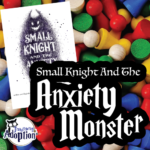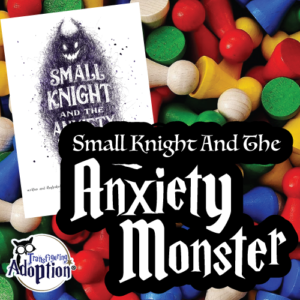
Small Knight and the Anxiety Monster – Book Review
Grade:
Transfiguring Adoption awarded this movie 4 Hoots out of 5 based on how useful it will be for a foster/adoptive family. [Learn more about our Hoot grading system here]
From the Cover of Small Knight and the Anxiety Monster by Manka Kasha:
“The worry kept growing day by day, until… one morning Small Knight woke up to see a huge inky monster in their room.
When Small Knight feels pressure from their parents to be a perfect princess, an anxiety monster shows up. No one else can see the monster, so Small Knight and their best friend Tiny Bear, decide that it is up to them to save themselves. They set off on a magical quest, only to discover that the answer was inside themselves all along. Turning to face the Anxiety Monster, they learn how to keep it under control.
Personal and whimsical, Manka Kasha’s debut picture book is a beautiful story about understanding your anxiety and finding the courage to face it.”
Transfiguring Adoption’s Overview:
Small Knight and the Anxiety Monster by Manka Kasha tells the story of a young princess who dreams of being a knight but must first find the courage to confront her anxiety. The story does a great job of illustrating what it can be like to be consumed by worrying and how it can literally feel like a monster following you around. The target audience is younger children (age 3-6) though is appropriate for all audiences and can be a good resource for starting conversations about processing anxious feelings.
** Spoilers Could Be Ahead **
How Is This Relevant To Adoption & Foster Care?
This book does not specifically address foster care or adoption, as the main character lives with both of her parents. However, many children who have experienced trauma also deal with anxiety and will likely relate to the feelings Small Knight has and her journey to understand and overcome this challenge. The themes of wanting to live up to parental expectations may also resonate with them.
Discussion Points:
- Parental Pressure/Expectations
Small Knight knows that her parents want her to be a good princess but she dreams of being a knight. This causes her to develop a lot of anxiety and worry about not being who they want her to be. This can be a challenge for all children but especially those who come from backgrounds of trauma. These children may feel like their home or placement is contingent upon their behavior and meeting expectations of their caregivers may be a big part of that. They may worry that if they aren’t perfect or the ’right’ kind of child they will lose the relationship. They may also feel caught between what they think their biological family wants versus what a foster or adoptive caregiver expects from them which can cause additional stress. This can be a great opportunity to talk to youth about their own hopes and dreams and interests and ensure they understand that your love for them doesn’t have to be earned and won’t go away if they express themselves. - Dealing with Anxiety
Understanding and processing anxious feelings is a central theme in the story. Small Knight gets so anxious that she begins to feel like a monster is following her around and she seeks out advice from all of her friends about how to overcome and defeat the monster. Eventually she realizes that it will always be a part of her but she has a say in how much control it has over her. Use this as an opportunity to talk with kiddos about their own anxieties- what kinds of things do they worry about? What does it feel like? How can you help them to face their own monster the way Small Knight does? How their anxiety presents and what helps will be different for each child but the important thing is to talk about it and figure out what works best for them specifically.
Cautionary Points:
- Worry about Upsetting Parents/being enough
Small Knight’s anxiety monster appears because she is so worried about disappointing her parents. For children who have similar concerns this may be upsetting to read about. - Anxiety depicted as monster that follows you around
While this is a great way to visualize what it can feel like to live with anxiety, the concept that anxiety is actually a monster following you around might be frightening to young children and potentially make their feelings of worry worse. - Parents are very dismissive
When Small Knight first starts feeling anxiety she tries to tell her parents about it but they laugh, tell her it’s her imagination, etc. and she is left to figure out how to feel better on her own. This might be very triggering for children who have tried to talk to a caregiver or adult about their feelings or something that was happening and were ignored or not believed.
Discussion Guide:
-
-
- What do you want to be when you grow up?
Caregiver Note: This is primarily just a fun question to facilitate bonding. However, when children experience a lot of trauma their brains are in a constant state of fight or flight and they spend so much of their energy surviving the present moment they don’t always get a lot of time to think about or imagine the future the same way the average child does. So this can be a great time to help them think about what kinds of things they might like to do or be when they get older. - Have you ever felt worried?
Caregiver Note: For young children the word anxiety might not hold a lot of meaning yet so it can be helpful to talk about what exactly it is. Children from a background of trauma also often have trouble identifying and labeling emotions so this can be a great time to talk about what worry looks and feels like in their body. - How does Small Knight feel when her parents dismiss her worries?
Caregiver Note: Small Knight goes to her parents for help when she starts to notice the anxiety monster lurking around. However her parents laugh at her and praise her imagination- they do not believe her about the monster or offer any concrete help. This likely makes her feel sad and confused. Children may have their own instances where they went to a caregiver or adult for help and were ignored or dismissed so if they feel comfortable, talk about their own experiences, but it’s okay if they need to just focus on talking about Small Knight. It’s also important to remind them that you won’t be like Small Knight’s parents and they can feel safe talking to you about anything and you will always listen and try to help. - Small Knight goes to many different creatures to ask for help. Who can YOU go to if you need help solving a problem?
Caregiver Note: This goes along with the previous question but in addition to reiterating that they can always come to you, feel free to help them make a list of other safe people they can go to if they don’t feel comfortable talking to you about it, or you aren’t present. This could include teachers, case workers, counselors, etc. - How does Tiny Bear support Small Knight? How can I be like Tiny Bear?
Caregiver Note: Tiny Bear goes with Small Knight on her quest to defeat the anxiety monster with no hesitation. They offer advice whenever Small Knight asks for it and even help Small Knight trap the anxiety monster. This can be a great time to talk about how you can be supportive to your child(ren) and what that might look like. - ACTIVITY: Map Small Knight’s Quest
Caregiver Note: Sometimes having an activity to focus on can make it easier to talk about difficult topics. Small Knight goes on an adventure to seek advice from her friends. Together, draw a map of the different places she goes to help visualize her journey! - What would you offer as a gift to the Dragon?
Caregiver Note: This is another opportunity for a fun question to help take a break from some of the heavier topics! It’s also a chance to practice brainstorming skills as well as anticipating what someone else might like or want. - How did Small Knight beat the Anxiety Monster?
Caregiver Note: Small Knight eventually realizes that they have to just face the Anxiety Monster head on and also that it will never fully go away but that she can take steps to be prepared so that next time it shows up she won’t be caught off guard again. - What helps you when you feel scared?
Caregiver Note: This answer is going to look different for every child- what helps one person feel less anxious might not necessarily help another. It’s important to talk about what specifically helps them. And they may not know what works best so you can work to come up with some ideas together and try some of them out. Some of these things include physical affection, breathing or grounding exercises, a distracting activity, exercise like taking a walk, or calming activities like coloring or music. - ACTIVITY: Draw an Anxiety Monster
Caregiver Note: Have children make an illustration of what they think their anxiety monster would look like! This can be as simple as a basic drawing or get creative with whatever craft materials you have on hand. On the back, help children write out some of the things they worry about. Once their monster is finished make sure to put the monster in a jar! This can be improvised with whatever type of container you might have on hand (or they sell small plastic or glass jars at most craft supply stores). Just like Small Knight now they can keep an eye on their anxiety monster so it won’t sneak up on them anymore.
- What do you want to be when you grow up?
-
About the Author: Jenn Ehlers
Jenn is a central Virginia native who received her BA in Psychology from the University of Virginia in 2012. Since then she has worked for a local mental health agency and the Department of Social Services in various capacities and has been involved in her community’s efforts to create a Trauma Informed Network. Currently Jenn works in vocational rehab and mentors youth in foster care. When she isn’t working, Jenn enjoys writing stories, anything and everything Harry Potter, and spending time with her niece and nephew.
**Transfiguring Adoption is a nonprofit organization seeking to nurture growth in foster and adoptive families by giving a HOOT about their families. Transfiguring Adoption does not intend for its reviewers nor its review to be professional, medical or legal advice. These reviews and discussion guides are intended to help parents to better be able to connect and understand their children who come from traumatic backgrounds.
